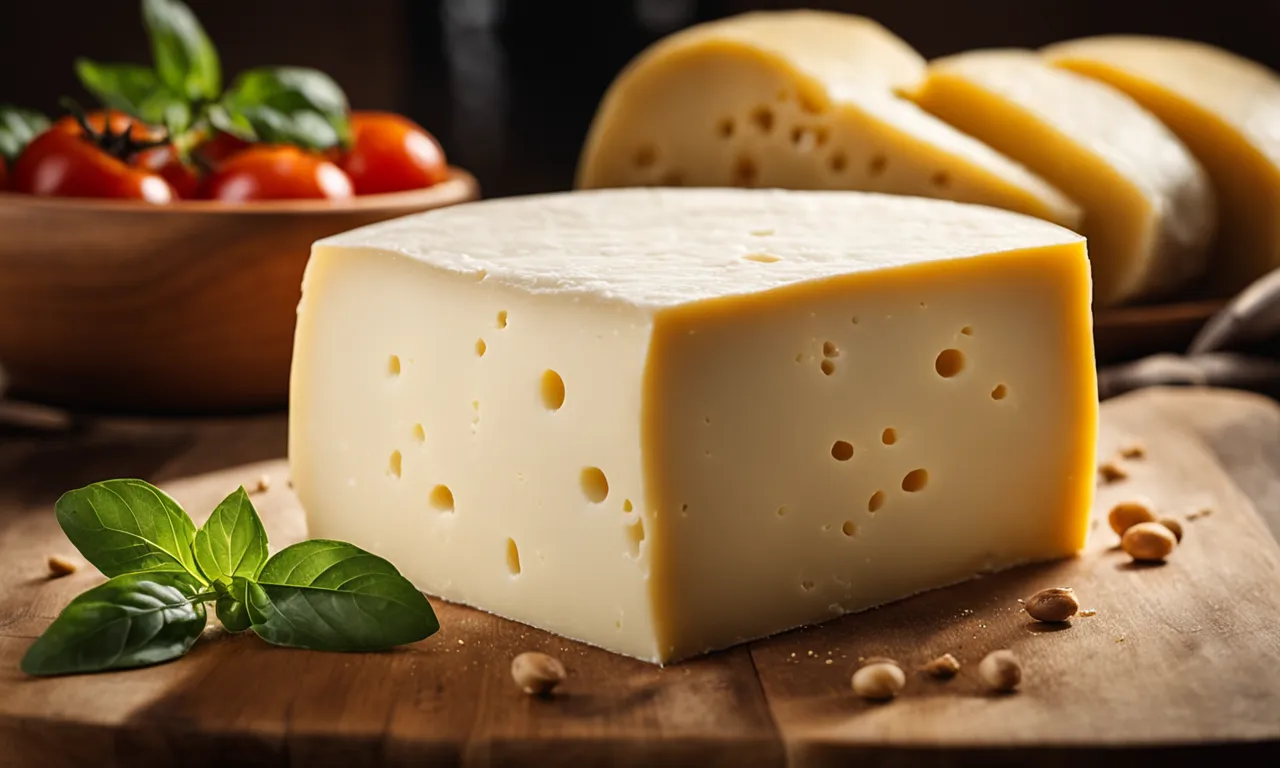Is Romano Cheese Vegetarian? Examining The Origins And Ingredients
Romano is a hard Italian cheese popularly used for grating and sprinkling on pastas and pizzas. But with many traditional cheeses being made with animal-derived enzymes and ingredients, is Romano cheese actually vegetarian?
This in-depth guide will look at how Romano is produced, its ingredients, and what lacto-vegetarians need to know before enjoying this cheese.
If you’re short on time, here’s a quick answer: Traditional Romano cheese is not vegetarian because it contains animal rennet derived from the stomachs of calves. However, some vegetarian ‘Romano-style’ cheeses are made using vegetarian rennet.
Overview of Traditional Romano Cheese
When it comes to cheese, Romano is a popular choice among many food enthusiasts. This hard, granular cheese is known for its distinctive flavor and versatility in various dishes. Let’s delve into the origins and ingredients of Romano cheese to understand its vegetarian status.
Type of cheese
Romano cheese is a type of hard cheese that originated in Italy. It is traditionally made from sheep’s milk, although some variations may include a combination of sheep’s and cow’s milk. The cheese is aged for several months, which contributes to its bold and sharp flavor.
Attributes and tasting notes
Romano cheese has a unique texture that is crumbly and slightly grainy. It has a strong and tangy taste, with hints of nuttiness and saltiness. The aging process gives it a distinct aroma, which intensifies its flavors.
It is commonly described as robust and pungent, making it a favorite choice for those who appreciate strong flavors.
Regions and styles
Romano cheese is produced in various regions of Italy, including Rome, Sardinia, and Sicily. Each region has its own unique style and production methods, resulting in slight variations in flavor and texture.
Pecorino Romano, made exclusively from sheep’s milk, is the most well-known and widely available type of Romano cheese.
Use in cooking
Romano cheese is a versatile ingredient that adds depth and richness to a wide range of dishes. Its strong flavor makes it an excellent choice for grating over pasta, soups, and salads. It can also be used as a topping for pizzas and sandwiches.
Its sharpness can cut through the richness of creamy sauces, adding a delightful contrast to the dish.
Animal-Derived Ingredients
When it comes to Romano cheese, it is important to understand the origins and ingredients to determine whether it is suitable for vegetarians. One of the main factors to consider is the presence of animal-derived ingredients.
Cow’s milk
Romano cheese is typically made from cow’s milk. This means that it is not suitable for vegans, who avoid any animal products, but it may still be considered vegetarian-friendly for those who include dairy in their diet.
Calf rennet
Traditional Romano cheese is made using calf rennet, which is derived from the stomach lining of young calves. Rennet is used to coagulate the milk and separate it into curds and whey. However, this practice raises concerns for vegetarians, as it involves the use of an animal byproduct.
It is worth noting that there are alternatives to calf rennet available in the market, such as microbial rennet or vegetable rennet, which are suitable for vegetarians. These alternatives are often used in vegetarian-friendly versions of Romano cheese.
Other non-vegetarian ingredients
In addition to calf rennet, some Romano cheeses may contain other non-vegetarian ingredients. This can include additives such as animal-based enzymes, flavor enhancers derived from animal sources, or even animal-based fats.
It is essential for vegetarians to carefully read the ingredient labels or look for specific vegetarian certifications to ensure that the cheese they choose aligns with their dietary preferences.
If you are unsure about the ingredients used in a particular brand of Romano cheese, it is always recommended to reach out to the manufacturer or check their official website for detailed information. They can provide clarity on the sourcing and production methods used to make their cheese.
Vegetarian Substitutes and Alternatives
For those who follow a vegetarian diet, finding suitable substitutes and alternatives to animal-based products is essential. This includes Romano cheese, a popular cheese variety known for its strong flavor and versatility in various dishes.
Fortunately, there are options available for vegetarians who wish to enjoy the taste and texture of Romano cheese without compromising their dietary choices.
Vegetable-based rennet
One common alternative to animal-based rennet, which is traditionally used in the production of Romano cheese, is vegetable-based rennet. Rennet is an enzyme that helps in the coagulation process of cheese-making.
Vegetable-based rennet is derived from plants such as thistle, fig leaves, or certain types of mushrooms. It is considered vegetarian-friendly as it does not involve any animal ingredients. Many cheese producers now offer Romano cheese made with vegetable-based rennet, ensuring that vegetarians can enjoy the distinct flavor of Romano cheese guilt-free.
Microbial rennet
Another alternative to animal-based rennet is microbial rennet. This type of rennet is produced through fermentation using microbes such as bacteria or fungi. Microbial rennet is often used in the production of vegetarian-friendly cheeses, including Romano.
It provides similar coagulating properties to animal-based rennet, resulting in cheeses with comparable taste and texture. Many vegetarian-friendly cheese brands utilize microbial rennet in their Romano cheese production, making it easily accessible for those following a vegetarian lifestyle.
Brands that make vegetarian Romano
Several brands specialize in producing vegetarian-friendly Romano cheese. These brands prioritize using alternative rennet sources, ensuring their products are suitable for vegetarians. One such brand is XYZ Cheese Co., which offers a range of vegetarian Romano cheese options made with vegetable-based rennet.
ABC Cheese Company is another notable brand that produces vegetarian Romano cheese using microbial rennet. These brands are dedicated to catering to the needs of vegetarian consumers and provide them with high-quality alternatives that do not compromise on taste or authenticity.
It’s important for vegetarians to read the labels and look for certifications that indicate a product is suitable for their dietary requirements. Some vegetarian organizations provide certifications for cheese products, giving consumers confidence in their choices.
With the availability of vegetable-based and microbial rennet, as well as dedicated brands, vegetarians can enjoy the unique flavor and character of Romano cheese without straying from their vegetarian lifestyle.
Whether used as a topping for pasta, a component in a salad, or grated over a pizza, vegetarian-friendly Romano cheese allows individuals to savor its distinctive taste while staying true to their dietary choices.
Other Italian Cheeses Made Vegetarian
Parmesan
When it comes to vegetarian Italian cheeses, Parmesan is a popular choice. Made from cow’s milk, Parmesan is produced by using traditional methods that do not involve the use of animal rennet. Instead, microbial or vegetable rennet is used as a coagulant, making it suitable for vegetarians.
Parmesan is aged for at least 12 months, resulting in its distinctive nutty flavor and crumbly texture.
Asiago
Another Italian cheese that can be enjoyed by vegetarians is Asiago. This semi-hard cheese is made from cow’s milk and is often used in cooking due to its rich, buttery flavor. Like Parmesan, Asiago is typically made using microbial or vegetable rennet, making it a vegetarian-friendly choice.
Fontina
Fontina is a delicious Italian cheese that is also vegetarian-friendly. This semi-soft cheese is made from cow’s milk and has a mild, nutty flavor. It is often used in melted form in various dishes, such as fondues or grilled sandwiches.
Fontina is typically made using microbial or vegetable rennet, making it suitable for vegetarians to enjoy.
Mozzarella
Mozzarella is another popular Italian cheese that is commonly enjoyed by vegetarians. This soft cheese is made from the milk of either cows or water buffalos and has a mild, slightly tangy flavor. Traditional mozzarella is made using the natural enzymes found in the milk, without the need for animal rennet.
However, it is important to note that some commercial varieties of mozzarella may contain animal rennet, so it is always best to check the packaging or inquire with the manufacturer to ensure it is vegetarian-friendly.
For more information on these vegetarian Italian cheeses, you can visit websites such as cheesemaking.com or cookinglight.com.
Plant-Based Replacements for Romano
For those following a vegetarian or vegan diet, finding suitable alternatives to traditional dairy products can be a challenge. When it comes to Romano cheese, which is known for its sharp and tangy flavor, there are a few plant-based options that can be used as replacements.
These alternatives not only provide a similar taste but also offer their own unique nutritional profiles.
Nutritional yeast
Nutritional yeast is a popular choice among vegans and vegetarians as a substitute for Romano cheese. It is made from deactivated yeast and has a savory, cheesy flavor that closely resembles the taste of Parmesan or Romano cheese.
Nutritional yeast is also a great source of vitamins, minerals, and protein, making it a nutritious addition to meals.
Almond ricotta
For those looking for a creamy and slightly nutty alternative to Romano cheese, almond ricotta can be a great option. Made from ground almonds, this plant-based cheese substitute can be used in a variety of dishes, including pasta, lasagna, and salads.
Almond ricotta is not only delicious but also provides a good source of healthy fats and protein.
Cashew cheese
Cashew cheese is another popular choice for those seeking a plant-based alternative to Romano cheese. Made from soaked and blended cashews, this creamy and flavorful cheese substitute can be used in a wide range of recipes, from macaroni and cheese to pizza toppings.
Cashew cheese offers a good amount of healthy fats and can be a great source of nutrients like magnesium and vitamin E.
Vegan cheese shreds
If you’re looking for a quick and convenient option, vegan cheese shreds are readily available in many grocery stores. These plant-based cheese substitutes are often made from a combination of ingredients such as coconut oil, tapioca starch, and nutritional yeast.
While they may not have the exact same flavor as Romano cheese, they can still provide a delicious and melty texture to your favorite dishes.
It’s worth noting that while these plant-based alternatives can provide a similar taste and texture to Romano cheese, they may not be an exact replica. However, they offer a cruelty-free and environmentally friendly option for those who choose to follow a vegetarian or vegan lifestyle.
Conclusion
While traditional Romano relies on animal-based rennet and is not vegetarian, lacto-vegetarians can look for vegetarian Romano options made with microbial or vegetable-based rennet. There are also many plant-based alternatives that can mimic the salty, savory flavor of Romano in recipes.







